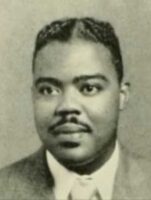
Update Feb. 20: The dedication ceremony scheduled for Saturday, Feb. 22, has been postponed due to inclement weather.
A grassroots civil rights attorney from Hertford County is being recognized by the North Carolina Highway Historical Marker Program.
Supporter Spotlight
The marker commemorating the late James Robert Walker Jr. is to be installed at the intersection of U.S. Highway 13 and N.C. Highway 42 in Ahoskie. The dedication ceremony is scheduled for 1 p.m. Saturday, Feb. 22, at the New Ahoskie Missionary Baptist Church, 410 West Hayes St., Ahoskie.
The Highway Historical Marker Program is a collaboration between the North Carolina departments of Natural and Cultural Resources and Transportation.
The first of eight children, Walker was born in 1924 and died in 1997. He was reared in Ahoskie in a family of educators with advanced degrees and the grandson of a preacher.
He served in World War II and, after being honorably discharged from the U.S. Army, he earned his bachelor’s degree from North Carolina College, now North Carolina Central University, according to a press release.
He was the first of two Black graduates from any program at the University of North Carolina Chapel Hill, graduating from its law school in 1952. He returned to northeastern North Carolina where he fought for voting rights in Halifax, Northampton, Warren, Bertie, Hertford and Gates counties.
Supporter Spotlight
Walker was the principal organizer and president of the Eastern Council on Community Affairs. The organization advocated for Black representation in local and state governing bodies, including town councils and state legislatures, and opposed bills for school separation or segregation, the press release continues.
Walker became the first Black member of UNC Chapel Hill’s Dialectic and Philanthropic Societies, the school’s debating and literacy society, and the oldest student organization on the campus.
The state’s NAACP also recognized him with its Distinguished Service Award for his efforts in civil rights. In 1961, he was the keynote speaker for the National Lawyers Guild in Detroit, Michigan, and in 1978, was named Lawyer of the Year by the same organization.







